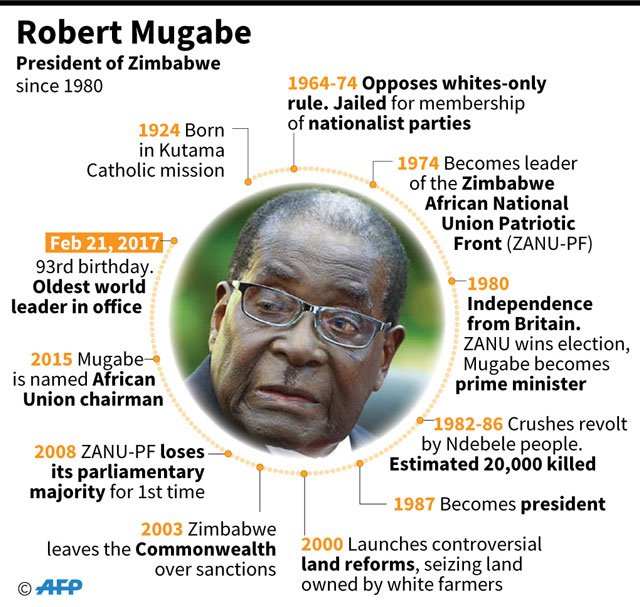
Mugabe: Liberation hero turned despot
Harare, Zimbabwe | AFP | Zimbabwe’s veteran leader Robert Mugabe once quipped that he’d rule his country until he turned 100.
But the 93-year-old’s decades-long grip on power was slipped on Sunday after his own party told him to resign or face impeachment. Sources close to presidency had said earlier that Mugabe has agreed to resign, although he did not say so in his speech televised live.
First heralded as a liberator who rid the former British colony Rhodesia of white minority rule, Robert Gabriel Mugabe was soon cast in the role of a despot who crushed political dissent and ruined the national economy.
After years behind bars as a political prisoner, Mugabe then led a bloody liberation war, which coupled with sanctions, forced the Rhodesian government to the negotiating table. The country finally won independence as Zimbabwe in 1980.
In elections that year, Mugabe swept to power as prime minister, initially winning international plaudits for his policy of racial reconciliation and for extending improved education and health services to the black majority.
But his lustre faded quickly.
– Stamping out dissent –
After his release from prison in 1974, Mugabe took over as head of the Zimbabwe African National Union (ZANU) which joined forces in the liberation struggle with Joshua Nkomo’s Zimbabwe African People’s Union (ZAPU).
Nkomo was one of the early casualties of Mugabe’s crackdown on dissent.
In 1982, he was dismissed from government, where he held the home affairs portfolio, after the discovery of an arms cache in his Matabeleland stronghold.
Mugabe, whose party drew most of its support from the ethnic Shona majority, then unleashed his North Korean-trained Fifth Brigade on Nkomo’s Ndebele people in a campaign that left an estimated 20,000 people dead.
It was the seizure of white-owned farms nearly two decades later that would complete Mugabe’s transformation from darling of the West into international pariah — though his status as a liberation hero still resonates in many parts of Africa.
Aimed largely at placating angry war veterans who threatened to destabilise his rule, the land reform policy wrecked the crucial agricultural sector, caused foreign investors to flee and helped plunge the country into economic misery.
At the same time, critics say, Mugabe clung to power through human rights abuses and by rigging elections.
 The Independent Uganda: You get the Truth we Pay the Price
The Independent Uganda: You get the Truth we Pay the Price





